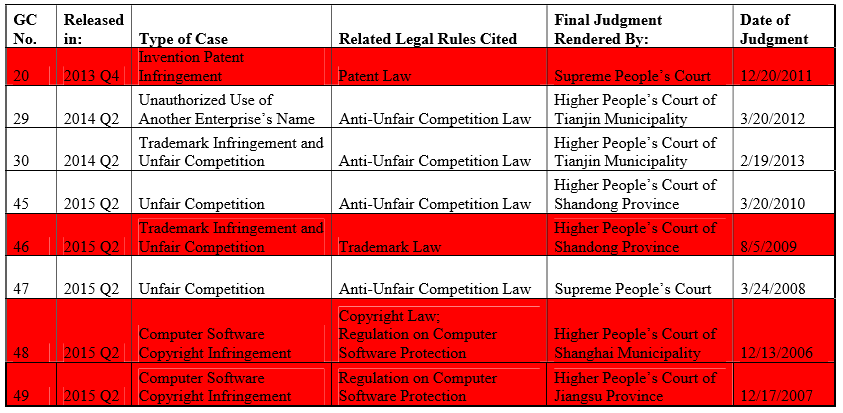52 Guiding Cases: 8 on IP and Unfair Competition
Since 2011, the Supreme People’s Court of China has issued 52 Guiding Cases (“GCs”). The court did not issue any GCs on IP or unfair competition until 2013 Q4 and 2014 Q2, respectively. Apparently triggered by its growing confidence in using GCs as a tool to provide more guidance, the court just issued another 5 GCs covering these two important areas (see Chart 1).
Chart 1:
The “Main Points of the Adjudication” sections for Guiding Case Nos. 20, 29, and 30—the text prepared by the Supreme People’s Court to help subsequent courts understand the GCs and how to “refer to” them—read as follows:
Where the Patent Law does not prohibit the manufacture, sale, and importation of an alleged patent-infringing product within the provisional protection period, which begins after the invention patent application is published and ends when the patent is granted, the subsequent use, offer for sale, and sale [of the product] are, despite the lack of a license from the patentee, not regarded as infringements of the patent. But the patentee may, in accordance with law, demand that the entity or individual who exploits the invention within the provisional protection period pay an appropriate fee.
1. An abbreviated enterprise name that has been widely used externally by an enterprise for a long period of time, that has a certain degree of market visibility and is known to the relevant public, and that actually already functions as a trade name, may be regarded as an enterprise name and [thus] be protected [under law].
2. Where, without authorization, [a business operator] uses another’s abbreviated enterprise name, which actually already functions as a trade name, as an Internet bid-for-ranking keyword in business activities, causing the relevant public to be confused and to misidentify [the enterprise], [the unauthorized use of the abbreviated enterprise name] is an act of unfair competition.
1. Whether or not a business operator has [carried out] an act that exceeds [its] legal business scope and violates administrative licensing laws and regulations does not affect its exercise, in accordance with law, of [its] civil rights to stop trademark infringement and unfair competition.
2. The [coverage of] the anti-unfair competition law is not limited to business operators having direct competitive relationships [amongst themselves] nor requires them to engage in the same industry. Where the business operators have indirect competitive relationships and the party [carrying out] the act [in question] violates the provisions of the anti-unfair competition law and adversely affects the legal rights and interests of the other business operators, [the act] should also be determined to be an act of unfair competition.
The full-text translations, including the “Main Points of the Adjudication” sections, of the other 5 GCs on IP and unfair competition are currently being prepared by Stanford Law School’s China Guiding Cases Project.
While we await final translation, please note the following new developments:
(1) For detailed analysis of the 52 GCs, see
(2) The inaugural Guiding Cases Seminar™, Why China’s Guiding Cases Matter?, was held with tremendous success at Stanford Law School on April 22, 2015. It featured an interactive panel discussion moderated by Yabo Lin, partner at Sidley Austin LLP’s Palo Alto office. Panelists included Dr. Mei Gechlik, founder and director of the CGCP, James McManis, Fellow of the International Academy of Trial Lawyers and Co-Chair of its China Program, and Jason Zuocheng Hao, former Director of the Civil Law Department of the Legislative Affairs Commission of the National People’s Congress in Beijing and current visiting scholar at Stanford Law School. Missed the event? Check out the full video and event summary here!
(3) Pro Bono opportunities
Contact jcbeck@law.stanford.edu if interested in joining the CGCP’s growing and global pro bono network. Opportunities are available for both individuals and law firms.
2 Responses to “52 Guiding Cases: 8 on IP and Unfair Competition”
Comments are closed.
Post Pagination



Sophia
Will the full-text translations that are being prepared by Stanford Law School’s China Guiding Cases Project be posted on this blog?
The CGCP Team
All our translations are available at https://cgc.law.stanford.edu/guiding-cases/. Thank you for your interest!